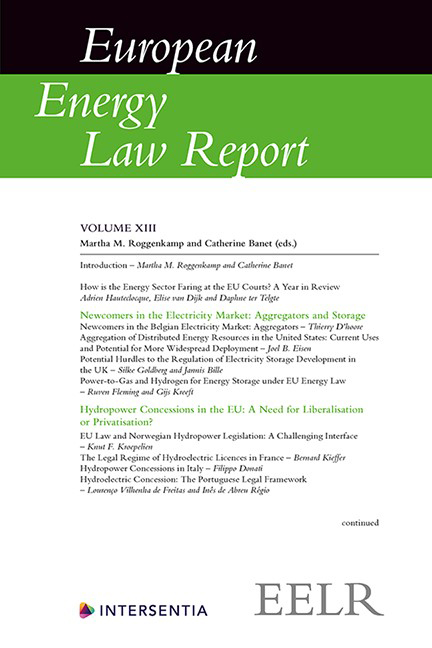Book contents
- Frontmatter
- Preface
- Contents
- List of Abbreviations
- List of Contributors
- Introduction
- Chapter I How is the Energy Sector Faring at the EU Courts? A Year in Review
- PART I NEWCOMERS IN THE ELECTRICITY MARKET: AGGREGATORS AND STORAGE
- PART II HYDROPOWER CONCESSIONS IN THE EU: A NEED FOR LIBERALISATION OR PRIVATISATION?
- PART III INVESTMENTS AND DISINVESTMENTS IN THE ENERGY SECTOR
- PART IV OFFSHORE DECOMMISSIONING IN THE NORTH SEA
- PART V CCS AS A CLIMATE TOOL: NORTH SEA PRACTICE
- PART VI FROM EU CLIMATE GOALS TO NATIONAL CLIMATE LAWS
Chapter X - The EU Approach to the Regulation of Guarantees of Origin
Published online by Cambridge University Press: 30 April 2020
- Frontmatter
- Preface
- Contents
- List of Abbreviations
- List of Contributors
- Introduction
- Chapter I How is the Energy Sector Faring at the EU Courts? A Year in Review
- PART I NEWCOMERS IN THE ELECTRICITY MARKET: AGGREGATORS AND STORAGE
- PART II HYDROPOWER CONCESSIONS IN THE EU: A NEED FOR LIBERALISATION OR PRIVATISATION?
- PART III INVESTMENTS AND DISINVESTMENTS IN THE ENERGY SECTOR
- PART IV OFFSHORE DECOMMISSIONING IN THE NORTH SEA
- PART V CCS AS A CLIMATE TOOL: NORTH SEA PRACTICE
- PART VI FROM EU CLIMATE GOALS TO NATIONAL CLIMATE LAWS
Summary
INTRODUCTION
Consumer preferences are shifting rapidly towards products and services that are produced in a socially and ecologically sustainable way. These products and services tend to be commercialised at a (sometimes substantial) premium, reflecting the higher costs of production ensuing from observing higher standards in terms of workers’ conditions and ecological impact. Evidence from the 2011 Eurobarometer survey has shown that the vast majority of Europeans consider environmental change to be an important issue, with the majority stating they are willing to pay more for environmentally friendly products or services. Yet, the claim that a certain product has been produced in a sustainable way is often substantiated by private labels, such as Fair Trade. People buying bananas with a Fair Trade label feel/know that they are making an environmentally and socially sounder decision compared to buying ordinary bananas. There are, however also public labels, such as the EU Bio-label. To seek evidence of the level of acceptance by consumers of green product claims, the European Consumers, Health and Food Executive Agency commissioned a Consumer Market Study on environmental claims for non-food products in 2014. The study found that mistrust in environmental information displayed on products and in advertisements is relatively common: 44 per cent of consumers say they do not trust this type of information. However, consumers’ trust in claims varies greatly depending on the specific environmental claim assessed.
Sales of electricity from renewable energy sources – often referred to as ‘green electricity’ – are on the rise in Europe, but this has also provoked considerable debate. A 2019 survey in the Netherlands found that about one in five Dutch people think that ‘green electricity’ does not exist. This is probably influenced by the enduring campaigns by some Dutch non-governmental organisations (NGOs) promoting the consumption of locally produced electricity from renewable sources, which use a marketing term that leads consumers with a green electricity contract that relies on non-Dutch certification to believe that they are being duped.
- Type
- Chapter
- Information
- European Energy Law Report XIII , pp. 197 - 218Publisher: IntersentiaPrint publication year: 2020



